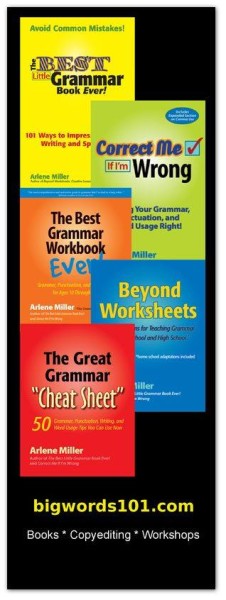
 An auto-interview? What is that? I decided that I would interview myself (I talk to myself all the time, anyway) to let you know a little bit about The Grammar Diva, but most of all “why grammar?” and “why did I write more than one grammar book?”
An auto-interview? What is that? I decided that I would interview myself (I talk to myself all the time, anyway) to let you know a little bit about The Grammar Diva, but most of all “why grammar?” and “why did I write more than one grammar book?”
Me: Why would anyone be interested in grammar?
I: You know, actually there are quite a few people interested in grammar. I hear from them all the time. You actually are probably grammar lovers. We probably all have our own reasons (or we are all just Virgos, anal-retentive, or both): For example, I can easily learn and figure out music theory, but I cannot put my thoughts into my hands and express them on the piano. I excelled at rhythm tap dancing, but never could really master ballet. I was great learning Latin (since it is grammar-based and not spoken), but I couldn’t speak a word of French after years of taking it in school. I think there is a pattern here that makes me good at grammar! Music theory, intricate tap rhythms, Latin grammar — they are all puzzles. I didn’t start our loving grammar. I started out wanting to be a writer.
Me: What kind of a writer? How long have you been writing?
I: The first thing I remember writing was a musical called Babes in Toyland (original?) for my friends. I was about 6, and we performed it for our mothers. I remember throwing a small fit because someone wouldn’t do it my way! As a teenager I wrote poems and lots of song lyrics. I became very interested in pop music and wanted to become a songwriter. By the time I was applying to college, my goal was to become a writer and write for a music magazine, namely Billboard. That is really the reason I followed the writing path and majored in journalism. Eventually, I worked for a short time as a newspaper writer and UPI editor in Florida. I then worked several years as a technical writer and editor for a computer company in Massachusetts (Wang). After I had my kids, I worked as a freelance editor until I went back to school for a teaching credential.
Me: What was your first book, and why did you write it?
I: I am not quite sure which book was first. It’s between The Best Little Grammar Book Ever and Beyond Worksheets. Beyond Worksheets is an ebook of grammar lesson plans that is on Amazon, on my website, and on a teacher site. That came about because my one and only student teacher–a couple of years after I began teaching–liked my grammar lessons and thought I should put them together in a book. I did that, and I am not sure whether that was right before or after the first grammar book. I think it was afterwards. That ebook, despite its ratings and ranking on Amazon, has garnered many positive comments on the teachers’ site! However, it doesn’t contain any technology. It can be adapted to homeschoolers, though, and probably even adapted for technology. As far as The Best Little Grammar Book Ever: Well, I noticed once I started teaching that people everywhere kept making the same grammar mistakes — when I was a writer and editor, and when I began as a teacher. I decided to write a book that concentrated on those errors. I outlined the book, and it sat there for a couple of years until I finally wrote it and published it in 2010. It has sold very well despite my lack of marketing time or talent!
Me: What about your other grammar books? How are they different?
I: I had never intended to write another grammar book after The Best Little Grammar Book Ever! But then, on Facebook one day, I had a message from a friend, also a writer, who said she had a dream that I wrote a book called Correct Me If I’m Wrong. I liked the title so much I thought I might as well write the book, and I did. It has some of the same things as the other book — after all, grammar is grammar. However, there is quite a bit of difference in both the content and setup. The issues are all presented alphabetically in Correct Me If I’m Wrong. There are also more word usage and more comma rules, but no quizzes, as are included in the first book. The Great Grammar Cheat Sheet is a short ebook with the highlights of the other grammar books, for a quick reference. I have just released The Best Grammar Workbook Ever! What a lot of work that was! I also have a novel that I wrote during NaNoWriMo (National Novel Writing Month) in 2011 and published on Amazon in print and as an ebook. I used a pseudonym since I was writing in such a different genre.
Me: What is next?
I: Well, I am retiring from teaching in June, so I will have more time for my business — maybe! I copyedit for other writers. I also am considering doing more corporate grammar/writing workshops, maybe online classes– and definitely more books! Fiction and nonfiction! Then, there is my blog, which I really enjoy doing.
Me: Is grammar your life?
I: Gosh. . .that sounds kind of sad, doesn’t it? It seems lately that grammar is my life, but really I have other interests! I would love to get back to music (composing, playing piano) at some point. I love to read, mostly chick lit. I love dogs. And then there are my kids, and they are my life! But I don’t see them that much at this point. 🙁
Then, there is coffee and Starbucks and listening to music. I am also interested in metaphysics and all things bizarre. I am also a CNN junkie….and I watch all the reality talent shows. How’s that?
Me: Thank you for your time.
I: I’m welcome!
Some announcements:
1. Thank you to those of you who offered a review of my new book. It’s not up quite yet.
2. Come see me and other writers:
This coming Saturday, March 28 – Local Writers Symposium
Sunday, April 12 – Solano County Bookfest
Friday, May 15 – Book Launch Event for The Best Grammar Workbook Ever!
And next week: A new series begins right here: The Seven (Deadly?) Sins of Grammar



“Thank you.”, “I’m welcome.”
Hilarious.
Like the joke about God sneezing, “God bless Me.”
(By the way, how’s my punctuation with the quotes?)
Thanks for this fun and informative self-interview.
I used this Q & A autobiographical format with my college students, and it enabled many of them to dig out interesting information about their lives. It works because questions often drive good writing.
You’re welcome! And I am glad it worked with your students! Did you do that before or after I did? Just want to know if I was original!LOL
Loved the article, Arlene. How clever it is for you to do your own interview. Your special and mean that with a smile.
I do not like the small (i) either. I was told it is because people use their cell phones and don’t want to take the time to make it a capital when they are texting fast on their cell. I have also noticed that most other countries never capitalize their (i)’s. Normally when I see a small (i) I know right away they are from a foreign country. I have not noticed the small (i)’s as Jim described above. More than likely it’s just another fad as Arlene said. I hope it will go away soon. I have to smack my fingers with a ruler not to write the person who used the small (i) to tell them to correct it.
Thanks for the comment, Sondra! Some of my students must think they are texting when they are writing essays because they use lowercase i for the pronoun!
Dear Grammar Diva,
What’s with the continuing practice of using the ninth letter in the alphabet in its lower case form (i) when all other letters in the word are upper case? Examples include “BABiES ARE US, PACiFiC SUN (our local weekly paper with MOViES).
Of course, there are many more examples. What’s the deal? Has the lower case of the ninth letter morphed into both lower and upper case form?
It’s really irritating.
Your thoughts?
Jim Koger
Wow! I have to say I have never noticed this. The only thing I have seen is my 7th grade students (and other students) using a lowercase i for the pronoun I! Must be a design fad? I don’t know. Anyone else noticed this?